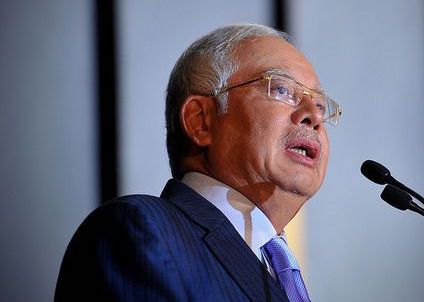Najib and the politics of survival

Other politicians have fallen for less – how has Najib managed to survive?
By Isabel Yeo, edited by Anne Hwarng, ASEAN today
In the last four years, Malaysia’s Prime Minister Najib Razak has faced numerous allegations. His current term has been marred by accusations of electoral fraud in the 2013 General Elections, the never-ending 1MDB scandal and allegations of judicial bribery leading to Anwar Ibrahim’s incarceration. Yet despite these controversies, and calls for his removal as Prime Minister, Najib remains Malaysia’s top politician and the chief of Barisan Nasional (BN).
How has Najib managed to survive?
Thus far, Najib has not actually been found guilty of any crime
During the 2013 elections, the legitimacy of the electoral results was questioned when reports emerged with stories of washable indelible ink, gerrymandering and multiple voters using the same address. While there were public outcries for each issue, the Electoral Commission eventually provided an explanation for each issue in their post-mortem. Though the losing Opposition coalition protested the results, the electoral results which favoured Najib’s BN were eventually accepted as legitimate. The rest of the country eventually moved on.
Regarding the 1MDB scandal, Najib was personally implicated when global investigators alleged that he had pocketed almost US$1 billion in funds from the 1MDB coffers. The United States’ Department of Justice also alleged that money was laundered via the 1MDB project – Najib’s brainchild. Nonetheless, Najib was found innocent by Malaysia’s Anti-Corruption Commission of all 1MDB related charges.
No official investigations have been launched over Najib’s supposed RM9.5 million (US$2.2 million) payment to the Deputy Public Prosecutor (DPP) of Anwar’s sodomy trial. Nonetheless, the High Court has ordered that the government and DPP Muhammad Shafee respond to these allegations.
Despite these controversies and allegations of corruption, Najib has not been found guilty of any wrongdoing by Malaysia’s courts. As such there has been little official justification to remove him from power. Najib remains firmly seated on Malaysia’s top political seat.
Najib’s political opponents aren’t scandal-free themselves
In 2016, fifty-eight of Malaysia’s political leaders issued a joint-statement saying “We call upon all Malaysians, irrespective of race, religion, political situation, creed or parties, young and old, to join us in saving Malaysia from the government headed by Najib Razak,” While the statement had little tangible effect on Najib’s position, leaders who voiced their opposition against Najib soon found their own political track record scrutinized.
One such leader is ex-Prime Minister Mahathir Mohammad. Dr. Mahathir is an outspoken critic of his successor Najib. “For me overthrowing Najib is far more important than any personal feeling I have about anything else,” said Dr. Mahathir in an interview.
The Malaysian government has since announced the setting up of a Royal Commission of Inquiry (RCI) to investigate massive Forex losses incurred under Mahathir’s Premiership. This move is seen as a defensive move against Mahathir’s criticism of Najib over the 1MDB scandal.
Censorship of dissenting voices
Anti-Najib civil movements have also been met with government crackdowns. The Bersih Movement, a pro-democracy group advocating for a clean government and Najib’s resignation, saw its leader Maria Chin Abdullah arrested before a mass rally in late 2016. The Bersih Movement had previously organised mass rallies that saw tens of thousands of protestors participating. Police also raided the office of Empower Malaysia, another civil rights organisation Maria was linked to. Other dissidents have been charged under Malaysia’s sedition law. Critics fear Malaysia’s new anti-terror laws will be used in the same way.
The Malaysian government has also blocked websites such as The Sarawak Report after it reported on global investigations into Najib’s possible embezzlement of 1MDB funds. In a statement about the block, Malaysian Communications and Multimedia Commission said “such content could create unrest and threatens national stability, public order and economic stability.”
There is still support for Najib on the ground
Although there have been mass protests calling for Najib’s resignation, Najib still enjoys support from UMNO’s traditional support base – rural Malays. Malaysia has also seen the emergence of its own “Red Shirt” movement, a pro-Najib movement organised by UMNO leader Jamal Yunos. Yunos has boasted of a 300,000 strong Red Shirt movement ready to confront Bersih Movement protestors at their rallies.
“Anything can happen. I am not saying we will use violence. Anything can happen, including violence,” Yunos said in an interview on the Red Shirts’ activities.
Najib’s position safe so far, but not secure
However, just because Najib has survived thus far does not mean he will continue to. While Malaysia’s courts have cleared him from wrongdoing in the 1MDB scandal, global investigations are still ongoing. The US is currently preparing to charge high profile businessman and close friend of Najib, Low Taek Jho, for fraud and money laundering via 1MDB. While Najib might have cleared local investigations, global investigations might eventually reach a different conclusion.
Malaysia’s upcoming elections in 2018 will be another test for Najib. Ex-Premier Dr. Mahathir’s and Najib’s previous Deputy Prime Minister Muhyiddin have defected from UMNO to form a new party under the Opposition coalition. The Parti Pribumi Bersatu Malaysia (PPBM) champions the interests of the Malay community, posing direct competition to Najib’s UMNO. The PPBM might erode Najib’s traditional support base in the 2018 elections. If the BN performs poorly in the next election, the anti-Najib faction within UMNO may grow stronger as well.
While Najib has remarkably held on to power the last few years, he is not out of the woods yet.

